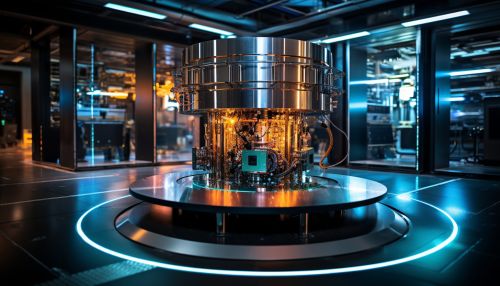Quantum Algorithms
Introduction
Quantum algorithms are computational procedures that run on a quantum computer. Unlike classical algorithms, which operate on classical bits, quantum algorithms operate on quantum bits, or qubits. Quantum algorithms leverage the principles of quantum mechanics to perform computations more efficiently than classical algorithms.


Quantum Bits
In classical computing, information is stored in bits, which can be either a 0 or a 1. In quantum computing, information is stored in quantum bits, or qubits. A qubit can be in a state of 0, 1, or any superposition of these states. This property, known as superposition, allows quantum computers to process a large number of possibilities at once.
Quantum Gates
Quantum algorithms are built using quantum gates, which are the basic building blocks of quantum circuits. Quantum gates operate on a small number of qubits and perform a specific operation. Unlike classical gates, which perform deterministic operations, quantum gates perform probabilistic operations due to the inherent uncertainty in quantum mechanics.
Quantum Algorithms
The development of quantum algorithms has been a significant area of research in quantum computing. These algorithms have the potential to solve certain problems much more quickly than classical algorithms. Some of the most well-known quantum algorithms include Shor's algorithm, Grover's algorithm, and quantum Fourier transform.
Shor's Algorithm
Shor's algorithm is a quantum algorithm for integer factorization. It was developed by Peter Shor in 1994 and is the first quantum algorithm that was found to be exponentially faster than any known algorithm running on a classical computer.
Grover's Algorithm
Grover's algorithm is a quantum algorithm for searching an unsorted database with N entries in O(sqrt(N)) time. It was developed by Lov Grover in 1996 and provides a quadratic speedup over classical search algorithms.
Quantum Fourier Transform
The quantum Fourier transform (QFT) is a linear transformation on quantum bits and is the quantum analogue of the discrete Fourier transform. The QFT is part of many quantum algorithms, including Shor's algorithm and quantum phase estimation.
Quantum Speedup
Quantum speedup is the potential for quantum algorithms to solve certain problems faster than classical algorithms. This speedup is due to the unique properties of quantum mechanics, such as superposition and entanglement. However, achieving quantum speedup in practice is a significant challenge due to the difficulties in building and maintaining a large-scale quantum computer.
Quantum Error Correction
Quantum error correction is a set of techniques to protect quantum information from errors due to decoherence and other quantum noise. Quantum error correction is essential for the practical realization of quantum computers, as it allows quantum algorithms to be run on noisy quantum computers.
Conclusion
Quantum algorithms have the potential to revolutionize computing by solving certain problems much more quickly than classical algorithms. However, the development of practical quantum computers that can run these algorithms is a significant challenge. Despite these challenges, research in quantum algorithms continues to be a vibrant and exciting field.
